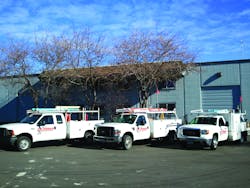L.A. Perks Petroleum Specialists of Nevada specializes in petroleum systems, construction and fuel services. Established in 1974, the company, which also does commercial and residential work, has a service area that covers the entire Western states region, but primarily operates in Nevada and California.
Perks Petroleum Specialists owns and operates 23 vehicles, 12 of which are diesel-powered pickups and service trucks. The fleet is serviced by outside maintenance shops.
All of the vehicles are assigned to specific drivers, says Kylen Perks, the company’s project manager and treasurer, because drivers tend to take better care of “their” equipment. The fleet’s annual mileage exceeds 500,000 miles.
Perks grandfather, LeRoy A. Perks Sr., founded the company which is now owned and operated by Kylen’s father, LeRoy Perks Jr.
With the cost of fuel a major operating expense, and seeking more ways to be a good neighbor, the company began researching ways to better manage fuel consumption and reduce vehicle emissions. It decided to give GDiesel fuel a try in its diesel-powered vehicles.
With the company’s involvement in the petroleum field, it was able to research GDiesel and evaluate its use for the company’s diesel-powered vehicles. “Using GDiesel made sense and seemed a natural choice for our fleet,” Kylen Perks says.
EFFICIENT PROCESS
GDiesel is produced by Sparks, NV-based Advanced Refining Concepts (ARC), a company that develops and manufactures fuels that produce cleaner emissions and more efficient combustion.
ARC’s inaugural product, GDiesel, uses the company’s zero-emissions ClearRefining process to create a cleaner burning fuel product that requires no modifications to engines or vehicles for use, or to fuel dispensing equipment or storage tanks, says Peter Gunnerman. He and father, Dr. Rudolf Gunnerman, founded Advanced Refining Concepts in early 2008.
Because GDiesel meets ASTM (American Society for Testing and Materials) D-975 standards for diesel fuel, it complies with all diesel engine warranties.
Advanced Refining Concepts’ proprietary ClearRefining process efficiently refines petroleum with methane derived from natural gas or renewable waste biogas sources, Gunnerman explains. This process is a new closed-loop, low pressure catalytic process that allows refining of liquids below the boiling point.
The resulting product, GDiesel, demonstrates cleaner emissions and more efficient combustion for improvements in fuel economy, and is available at about the same price as conventional diesel fuel, he says.
ClearRefining is unique in that the entire system can be run efficiently off of the electric grid which makes this the first zero emission refining process, notes Gunnerman.
The Gunnerman family is responsible for bringing five patented clean technologies to world markets in the past four decades, including wood pellet fuel, emulsified fuels and ultrasonic upgrading of petroleum products, among others. The family established ARC to further develop and market its ClearRefining technology.
SOUND REASONS
One of the selling points in switching to GDiesel was not having to make modifications to company vehicles, says Perks. Another was the fuel’s designation by the Nevada Division of Environmental Protection (NDEP) as an alternative fuel in Nevada’s Alternative Fueled Vehicles in Fleets program.
The NDEP designation allows government fleet operators in Nevada to consider GDiesel as part of their fuel strategy. Nevada requires all government fleets in the two most populace counties, Wahsoe (Reno) and Clark (Las Vegas), to run on alternative fuels.
Another reason for the change to GDiesel was that the infrastructure for obtaining GDiesel was already in place in the Nevada area, so finding the fuel was not an issue, Perks says. The fuel is currently sold by various fuel distributors, retail fueling stations and truck stops.
L.A. Perks Petroleum Specialists has its own aboveground fueling system for GDiesel at its facility in Sparks.
The GDiesel fueling infrastructure is being expanded as ARC ups its production capabilities, says Gunnerman. Should GDiesel not be available, regular diesel fuel can be used because it is compatible with traditional fuel products.
“One of the attractive features about GDiesel,” Perks adds, is that vehicles can run on pure GDiesel, No. 2 diesel or a blend of the two. So when you are traveling out of the area, there are no worries when it comes to finding fuel.”
By switching to GDiesel for its vehicles, L.A. Perks Petroleum Specialists didn’t have to invest in new vehicles or component and systems add-ons to gain fuel efficiency and emissions reduction benefits. No extra vehicle maintenance or servicing is needed, and there are no additional training requirements or duties for its drivers.
“Companywide, everyone is happy with the performance of GDiesel,” says Perks. “There have been noticeable mileage improvements and power increases. Once someone tries this product it will be hard for them to return to regular diesel.”
Another level of fleet control
GPS tracking of fleet vehicles is becoming an increasingly invaluable resource for fleets, allowing for control of, and insight into, all fleet-based activity. GPS solutions can help to significantly reduce fuel and labor spent, offering in-depth reports and alerts that will limit speeding, curb idling, cut unauthorized usage and optimize drivers’ routes.
GPS fleet tracking can help reduce speeding violations by clearly showing who is speeding and where, says Ryan Driscoll, Marketing Manager of GPS Insight, a leading supplier of reliable GPS tracking, navigation and messaging technology for fleet-based customers. This can be done with scheduled reports and instant alerts that notify management and/or the driver of any vehicle speeds that top fleet-set thresholds. Alternatively, a report can be run to show how drivers’ speeds compared to the posted speed limits.
“This valuable technology also provides management with the ability to control excessive idling, with instant alerts notifying drivers to shut down their vehicles after a certain time threshold,” Driscoll says. “The reduction in idle time alone typically provides a positive ROI from the solution.”
Unauthorized usage of company vehicles can also be eliminated with GPS solutions. GPS fleet tracking helps identify costly and risky vehicle usage, such as driving on narrow roads or in “bad” neighborhoods. It also allows awareness of any side jobs and personal usage of company vehicles, such as driving a vehicle for personal use during work hours or for weekend trips.
In addition, GPS fleet tracking helps decreases miles driven by optimizing driver routes with navigation and dispatching systems. By way of example, GPS Insight’s technology incorporates Garmin's fleet management and dispatch messaging interface that allows for two-way messaging, on-the-fly dispatch and the sending of complete routes to a dashboard-mounted navigation device.
“This prevents drivers from taking the long route or getting lost, saving time, miles driven, fuel, and ultimately, money,” says Driscoll.
The information GPS fleet tracking provides can be used to hold employees accountable for wasted time and/or fuel, enabling new standards to be implemented, thereby increasing driver performance.
“A tracking solution gives you insight to more than just ways to reduce fuel costs,” he points out. “The relevant and timely information gathered can be used to help improve productivity, reduce labor costs, extend fleet life and more effectively manage a fleet.”
As with any technology, the better a GPS solution is used, the better the results and overall savings.
“Proactive adoption across the organization is critical,” Driscoll stresses. “A well implemented GPS fleet tracking solution will unquestionably reduce fleet-related costs, providing almost instant ROI across fleets of all sizes.”
Trucks fueled by propane autogas are sustainable performers
While fleet managers must pay strict attention to the fuel economy of the vehicles, they also have to be cognizant of performance and sustainability as well.
“As the standards for reducing emissions continue to rise, the growing number of light duty trucks that operate on propane autogas are proving they exceed those standards and performance expectations,” says Brian Feehan, vice president, Propane Education & Research Council (PERC) an organization whose “mission is to promote the safe, efficient use of odorized propane gas as a preferred energy source.”
PERC was authorized by the U.S. Congress with the passage of Public Law 104-248, the Propane Education and Research Act (PERA), signed into law on October 11, 1996.
Propane autogas is nontoxic, colorless and virtually odorless. An identifying odor is added so it can be readily detected.
Propane autogas fuels more than 270,000 on-road vehicles today in the U.S., including pickup trucks, vans, shuttles, taxis, delivery vehicles and school buses, Feehan notes. Worldwide, the number of on-road vehicles fueled by propane autogas is more than 13 million.
“Propane autogas is the nation’s third-most common vehicle fuel after gasoline and diesel,” he says. “That’s one reason truck manufacturers are working diligently to develop additional on-road vehicle platforms fueled by propane autogas. Within the past 20 months, 10 new vehicle platforms have been developed.”
By way of example, Feehan cites the Roush CleanTech liquid propane autogas injection fuel systems for Ford F-series trucks and E-series passenger, cargo and cutaway vans. “The systems offer the same horsepower, torque and towing capacity rating as gasoline-fueled equivalents, while reducing greenhouse gases and particulate emissions.”
Ease of refueling is also hastening the growth of vehicles that operate on propane autogas. Propane autogas providers can help a fleet determine the most appropriate refueling option for their operation.
On-site refueling infrastructure - depending on storage necessity, longevity and available space, includes underground storage tanks for longer-term use or above-ground skids that can be shifted or moved as necessary.
The number of propane autogas refueling stations has reached 2,500 in the United States, according to the U.S. Department of Energy’s Alternative Fuels and Advanced Vehicle Data Center, says Feehan. There are locations in every state, including more than 200 in Texas and California each and 100 or more each in Arizona, Florida, Michigan, Missouri and Pennsylvania.
In conjunction with Texas State Technical College, CleanFuel USA recently received a $12.9 million Department of Energy grant to develop a curriculum for alternative-fuel vehicle technicians, he says. The grant includes a provision for installation of more than 160 propane autogas refueling stations in selected U.S. metropolitan markets.
“Light duty trucks fueled by propane autogas offer a viable alternative to conventionally fueled vehicles,” concludes Feehan. “The combination of robust propane autogas engine technology, increasing availability and existing refueling infrastructure is building a strong case for fleets looking for an alternative fuel with vehicle performance and sustainability.”
About the Author

